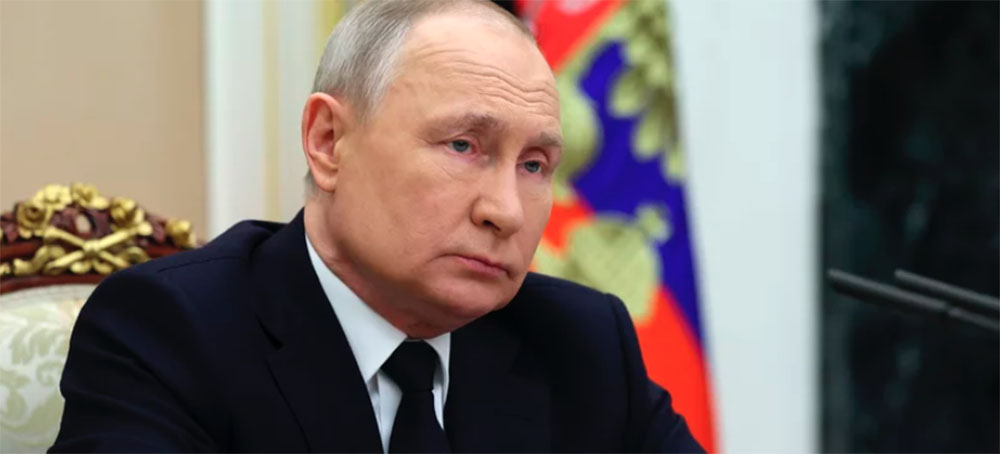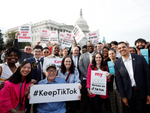Live on the homepage now!
Reader Supported News
Protests against a plan to build a new training center for police and firefighters in Atlanta have spread to cities across the country. The center's critics are wary that, if successful, it could create a precedent for others to follow.
For more than two years, the proposed training center, dubbed “Cop City” by its opponents, has been the subject of criticism from environmentalists and social justice advocates alike, who argue that its construction would harm the local ecosystem and accelerate the militarization of the police. But in recent months the issue has garnered increased national attention, especially after the fatal police shooting in January of Manuel Terán, a 26-year-old environmental activist who was protesting the facility’s construction.
In the immediate aftermath of Terán’s death, vigils in his honor were held across the country, from Tallahassee to Los Angeles. Since then, what began as a local issue has continued to spark demonstrations in a variety of other cities, where activists have felt inspired to stand in solidarity with Atlanta while warning against the construction of similar facilities in their own backyards.
In late February, dozens of protesters took to the streets of downtown Detroit, stopping midday traffic while chanting, “Stop Cop City!” Less than two weeks later, similar chants were shouted by more than 50 students and community members on the campus of Harvard University. Then last weekend, in Providence, R.I., dozens gathered outside a Home Depot with signs that read, “Defund and Reimagine.”
Students at Harvard said they rallied because of their own concerns about systemic police violence.
“Believe it or not, the same concerns in Atlanta are also in Massachusetts, whether we have our own Cop City to prove it,” Karen Choi, a sophomore at the school and one of the event’s organizers, told Yahoo News. “The issue of violence is systemic, rooted in a history of police brutality that has long been safeguarded by a numbers game that prioritizes profit.”
Maggie House, a student at the Harvard Graduate School of Design, said she chose to demonstrate because she believes police brutality, forest devastation and climate change are “national and global issues which unite our generation.”
“Allowing Cop City to move forward not only increases the risk for militarized police force[s] to be used against all Americans, it has the potential to carve a pathway for private investors to partner with police foundations nationally to create similar projects with equally devastating effects,” House told Yahoo News.
Detroit activists offered similar explanations for rallying against the Atlanta training center.
“Those same tools of militarized police impact us here in Detroit, just as they do in Atlanta,” Antonio Cosme, an education coordinator with the National Wildlife Federation, told Bridge Detroit last month. “I see Detroit and Atlanta as being deeply, deeply interwoven in their cultural fabric.”
Tiffany Roberts, a public policy director for the Southern Center for Human Rights, an Atlanta-based public interest law firm dedicated to prison reform, has been an outspoken critic of the center. She told Yahoo News that she’s encouraged by the wide range of demonstrations taking place in cities across the country.
“The courageous organizing by these young people has really been a source of pride for me,” Roberts said, adding that she thinks the intersectionality of issues on display in the Cop City debate makes it resonate more widely. “They can talk about police militarization and they can talk about the environment and they can talk about environmental racism.”
In an interview with the Intercept earlier this year, Casey Sharp, a Georgia-based archaeologist who has helped facilitate communications between activists and local leaders in Atlanta, predicted that the Cop City protests “will become another Standing Rock,” referring to demonstrations beginning in 2016 over the planned construction of a 1,200-mile-long oil pipeline through the Standing Rock Sioux Reservation in North Dakota that drew national attention.
The debate over Cop City
The Atlanta Public Safety Training Center, which is set to include a shooting range, fire training towers and a mock city featuring homes and streets, was approved by the Atlanta City Council in 2021 with the backing of the Atlanta Police Foundation (APF), a nonprofit largely funded by corporate donors. Amid a flurry of lawsuits attempting to halt the project altogether, a spokesperson for the city said “construction is ongoing” but offered no specifics on the current status of the center.
The training center is estimated to cost around $90 million, a third of which is expected to be paid by taxpayers. The rest will come from private donations raised by the APF.
Proponents of the center say it is needed to help boost law enforcement recruitment, retention and morale in the wake of severe staffing shortages in the city.
Atlanta City Council member Michael Julian Bond, who voted in favor of the plan two years ago, told Yahoo News in January that the center represents a necessary investment in public safety that’s been decades in the making.
“The city desperately needs new training facilities,” Bond said, citing an increase in 911 calls in the last three years after the police killings of George Floyd in Minneapolis and Rayshard Brooks in Atlanta. “There is a continuingly demonstrated need for police, fire and emergency services.”
But critics believe that besides harming the region’s environment, the facility will further strain relations between police and the community, particularly the Atlanta area’s majority Black population.
In an interview with the New York Times earlier this month, Arthur Rizer, a former Washington state police officer and policing expert, said, “I do share the concern of the citizens of Atlanta that the apparent focus is going to be a paramilitary-type training, urban assault tactics, which quite frankly have not been effective at reducing crime.”
Activists fear Atlanta’s Cop City could set a precedent
In recent months, the growing backlash against Cop City in Atlanta has raised concerns for activists in other parts of the country that their cities could be next.
“Cop City, if built, will set a new precedent for police militarization, not just in Atlanta, not just in the Southeast, not just in the country, but in the world,“ Jonah Sylvester, an organizer with the Weelaunee Defense Society of Pittsburgh, told the Pittsburgh City Paper earlier this month.
In 2020, the city of Pittsburgh acquired a former hospital from the federal government, at no cost, in order to build a regional policing and first responder training center, similar to the one proposed in Atlanta. Though no concrete plans have been put in motion, city officials have said the project would cost about $120 million.
In New Jersey, Gov. Phil Murphy, a Democrat, included in his latest budget a new $120 million state police training center to replace the 100-year-old facility currently shared by the State Police Academy, the National Guard, the New Jersey Department of Corrections and the Juvenile Justice Commission.
The recent push for new police training centers in Atlanta and elsewhere is a direct response to the 2020 protests following the murder of Floyd and other high-profile police killings.
Atlanta officials like Mayor Andre Dickens, a Democrat, have touted the police training center as exactly the kind of reform that community members demanded in 2020.
“Good community policing depends on high-quality training,” Bryan Thomas, a spokesperson for Dickens’s office, told Yahoo News.
But critics are wary of any type of massive investment in policing, arguing that the focus on training misses the point of what the 2020 protests sought to accomplish.
“It wasn’t training that people asked for in 2020,” Roberts said. “What people asked for in 2020 was for police to stop killing [Black] people.”
Environmental concerns over the center
Environmental activists also object to the plans for the center, which is slated to be built on the site of a former prison farm in the South River Forest, a sprawling 3,500-acre green space just outside the city’s limits.
The land was designated as part of a 2017 proposal to create green space and recreation options for underserved parts of Atlanta. But the City Council scrapped those plans just four years later, agreeing instead to lease the land to APF to build the training center.
Many community activists argue that preserving the park’s greenery will help combat climate change, as trees absorb carbon dioxide and produce oxygen, while making the area less susceptible to flooding.
Terán, who was killed following a clash with police in the South River Forest in January, was among those who objected to the training facility for environmental reasons.
His death, which is being investigated by the Georgia Bureau of Investigation (GBI), has prompted widespread outrage, exacerbating long-simmering tensions between protesters and law enforcement throughout Atlanta.
While police initially claimed that Terán was shot after he opened fire on a state trooper, evidence has since come to light that casts doubt on that narrative, including body camera footage from one of the responding officers at the scene as well as the findings of an independent autopsy commissioned by Terán’s family.
The Atlanta Police Department declined Yahoo News’ request for comment on the shooting, and the GBI pointed to its previous statements about the case.
“The GBI cannot and will not attempt to sway public opinion in this case but will continue to be led by the facts and truth,” the bureau said in a statement on March 10. “We understand the extreme emotion that this has caused Terán’s family and will continue to investigate as comprehensively as possible.”
Peaceful vigils held throughout Atlanta in the wake of the shooting have turned violent in recent weeks. At one particular demonstration earlier this month, three dozen people, many of them from out of state, were arrested and charged with domestic terrorism after, police said, they hurled bricks and fireworks at officers.
According to Atlanta police, a group of violent agitators had used “the cover of a peaceful protest” to “destroy property and attack officers.” But Defend the Atlanta Forest, a local activist group, insists that those arrested, including one person from Canada and another from France, weren’t actually among the agitators, but were simply concertgoers attending a nearby music festival.
City Council member Bond, whose father, Julian Bond, was a prominent leader in Georgia’s civil rights movement, condemned those who have responded to Terán’s death with violence.
“I regret that someone has lost his life in pursuing his ideals as an activist,” Bond said. “I also regret that a peaceful demonstration about his death was co-opted by a few who embedded themselves to commit acts of violence.”
“Martin Luther King never set a police car on fire,” he continued. “And he changed the world.”
Follow us on facebook and twitter!
PO Box 2043 / Citrus Heights, CA 95611














